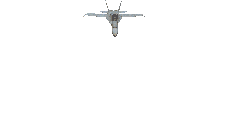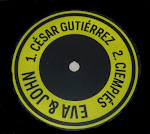80M83R: the kinetic novel by Czar Gutiérrez
10 Octobre 2011 Par Anouk Guiné
From rags of my saxophone
Blue velvet of my clarinet
That rises and falls like the sun
Till reaching the divine incandescence
Of the drum and the trumpet. There is also
A purple felt piano
Whose notes cover the orchestra As the tide.
So the music
Cannot be heard the silence takes shape
In the retina and the beat
The beat the beat
Is always atrocious and sovereign
Like the ocean
Today I’d like to talk about my concert, J.E. Eielson
Bomber [1], which is not a book but a "device", as its author says, is a great display of cyberpunk and biopunk poetry, a weapon of language mass deconstruction and a particle accelerator.
My reading of this novel, which is not a novel, but a synthesis, crystallization and paradigm of all the literary genres that are known to us, began, because I wanted it to, above the clouds at exactly 9500 m. altitude, 967 km/h, with 10210 km to go to my final destination. Bomber and I have crossed the skies and nights of a thousand refuges from Nubegris (as Lima is named in the book) to Paris, via Amsterdam, on board a Boeing 747-400. Middle Eastern Arabic music offered on board by KLM, flooded and nurtured my reading for over 9 hours. I could not imagine starting Bomber without Arabic music, the perfect soundtrack for a story that is based on the 09/11 Towers attacks.
I did not want to stop flying until the last page. Because once you enter this paper, this text, this machinery and mechanics of flows, fluids and fragments, you don’t see the world, beauty and poetry as you did before. And I challenge anyone to refute the fact that there is and will be a before and after Bomber in the history of Latin American literature.
Citing Mircea Eliade, the writer and jurist Kadel Sabir (2011) writes in 9 / 11: Credo quia absurdum (Agoravox):
Ground Zero has become an Axis mundi, a hierophanic place par excellence where the "sacred manifests itself" ; this irruption of the sacred creates a fixed point around which all values gravitate. Just as it is thought that the sun revolves around the earth, it is thought that morality today revolves around Ground Zero.
I think that in the same way that Ground Zero is the axis ofBomber, the history of the novel, its sacred meaning and values, will have to revolve around Bomber. The millimetric, surgical and corrosive words of the Peruvian poet Czar Gutiérrez, his language, never aggressive and very elegant, the graphics, codes, symbols, pain, internal circuits -be they electronic, mechanical, chemical or human- the virtual networks that are continuously explored, as well as the movement that the author gives to the aircraft, the bodies, metals, crystals, plasma, mercury, joys, brains, light, speed, feelings and death, are amazing because new and highly innovative.
I say "movement" because I think that Czar Gutiérrez inaugurated the era of the kinetic novel. And I say « electronic » because I think he also inaugurated the cybernetic age of the Latin American novel. We are in the presence of writing that knows the art of stopping an aircraft in flight and blowing it up with the infinity and eternity contained in the highest poetry that is only pleasure.
We are fully in Roland Barthes's logic when, in "The Pleasure of the Text" (Le plaisir du texte, 1973), he states:
Writing is this: the science of the pleasures of language, its Kama Sutra (of this science, there is only one treaty: the writing itself) ... I'll go as far as feeling pleasure from a disfiguration of language, and the opinion will highly cry out, because it does not want « nature to be disfigured ».
And to disfigure the language as Czar Gutiérrez does, it requires us not only to love and suffer in every sense of the word, but also to put ourselves in constant danger through language, its structure and its pleasure. Because this is what it is about here, I repeat,the pleasures of language and feeling pleasure from a disfiguration of language.
Devour me, deform me to your image, writes Marguerite Duras in Hiroshima mon amour, in the midst of a place disfigured by war and where love pleasure also tends to the desire of disfiguration of the body. In fact, since the beginning of the first chapter, Reset, Czar Gutiérrez says: Someone is about to disfigure the geometry of the globe, someone is willing to delete the coordinates, someone is wanting, someone is searching, someone is planning.
What we do not know yet, is that the author is about to disfigure the geometry of the language and the bodies in a kind of fragmentation that reminds us the poetry of J. E. Eielson, in particular Dark night of the body. From dust to dust, Czar Gutiérrez operates these disfigurations by building a new architecture of the novel and of the mechanics of writing, inaugurating a new relationship between the structural communities that connect the written made of "letters" and the written made of "images", as stated in the "textique" (http://www.ccic-cerisy.asso.fr/textique11.html), which aims to establish a theory that unifies the writing structures.
Moreover, Czar’s work also belongs to the fine arts in so far as it moves our senses from a tactile, visual and musical dimension, to the extent of inspiring artists like Tito Dominguez (frontman of the duo Jardin Solar from Trujillo, Peru) who works from the visual arts and electronic music http://www.youtube.com/watch?v=nk7SJOobvWk (2009), Sophie Canal (writer) and Gabriel Gargurevich (musician) who composed a song produced by Jonni Chiappe: http: / / www.goear.com/listen/f992b4c/la-chanson-de-cesar-gabriel-gargurevich-sophie-canal (2010), or Susana Bouroncle, who dedicated an exhibition of paintings, installations and murals to the author: http: / / www.youtube.com/watch?v=alwtlSvFQo4 (2011). Together with the tributes of Delay Tambor, electricians from Arequipa (Peru) (http://www.myspace.com/delaytambor), or Plan Quinquenal from Buenos Aires (http://www.youtube.com/watch?v=swHKQKxS2dk&feature = player_embedded & NoRedirect = 1), among other remixes:
Gutiérrez turned the ruins (of 11S) into a writing workshop and his book into a literary pilgrimage that made him the product of his own novel, which he kept transforming on the Internet, video art, high-tech reading, and, ultimately, as an act of literary faith that is only parallel to Joyce’s "Work in progress", to Julian’s Ríos en Larva, and to the unveiled novel under the ones by Perec
as Julio Ortega (2011) so correctly points out in Imaginario 9-11(http://www.elboomeran.com/blog-post/483/11248/julio-ortega/imaginario-del-119/).
The plastic aesthetics of Bomber emerge as a sensual experience -also frequently achieved through humor- where each page and each sentence, even the most disrespectful of them, proves to be fascinating. It is without question a text that transforms our relationship to writing, reading, literary genres, the object book, computer writing, poetry and prose. I am reading Bomber as I listen to the celestial music of Philip Glass. As a fundamentally musical work, this novel makes us enter the minimalism and repetitive structures worthy of works such as Dance 8:
Glass is a master of electronic circuits that fed progressive rock, a genre that has always nurtured the author who is an ex dj. In his "flight recorder", he writes that he punctuates the novel withpopular music, acoustic, retro, pop, punk, postpunk, new wave, acid, psychedelic, emo, house, indie, jungle, latin, lo-fi, dance, noise, singer, trance, trip-hop ...
And when I read:
the steel fist hammers and hammers and hammers the sand until the desert bleeds black ... I have plenty of time to machine-gun you and see your face destroyed, 48 Scuds have just been thrown out with bass drums and cymbals and have ended up not being intercepted ... Luscious is the smell of the Word, luscious is the smell of Ebola, beware of the Scuds, beware of the satellites, beware of Astra and Eutelsat, death no longer exists if you look into my eyes, my love, the fist hammers the steel and the war nightingales sing: air hymn / a-i-i-i-r hymn
I feel the futurepop and synthpop adrenaline given by Apoptygma Berzek (APOP) :
It can be said that Bomber is a great hymn to Electronic Body Music (EBM).
What happens is that David Bowie, one of the characters of the novel, has been a great admirer of P. Glass since his performance at the Royal College of Art in London in 1970. Bowie then wrote the minimalist and abstract piece Low(http://www.youtube.com/watch?v=quE7e-1ZDqk&feature=related), praised by Glass in 1992. Four years later, they recorded together Symphony No. 4 "Heroes" at 26 Mixes for Cash (Aphex Twin): http://www.youtube.com/watch?v=FjBcNU1UZUs&feature=related. Czar Gutiérrez celebrates the original version of Heroes(1978): http://www.youtube.com/watch?v=Phf0WWlfbF8&feature=related to the extent of offering a part of its sacred score in the middle of the book, and brilliantly poeticizing no less brilliant works such as Neuköln:
b0W1e’s sax is now beginning to emerge as a lonely hand from a train station that is covered by clouds of strontium, the sax is spreading out in orphaned and empty spaces where it never stops falling, the sax bounces and hurts itself and collapses again to end up sinking in a sea of exquisite spirals and howls and loneliness that can only draw the path of a man who makes his way towards the dust under the watchful eye of the stars in the shape of a song that is dying of a sweet and violent and enthralling and brutal death, rip.
Because of his creative complexity, Czar Gutiérrez, heir, among others, to Glass, Bowie and Eielson, belongs, like them, to the innovators and transgressors who make history.
________________________________________
[1] The first edition of nearly 600 pages was published by the author in 2008, and replicated in three parts [Ground Zero(2009), We are in the air (2010) and Air Hymn (2011)] by Grupo Editorial Norma: Its translation into French and English is in progress.











![[TOMO1]: 6r0undz3r0](http://3.bp.blogspot.com/_Gr4uFMUVlR0/SM7QyGraUFI/AAAAAAAAAIs/7z2Au0ttMZ4/S150/Cover_8OM84RD3RO7.jpg)

![[TOMO 2]: 3s74m053n3l4ir3](http://1.bp.blogspot.com/-ttafecsgB5o/UXRd_V-9f1I/AAAAAAAAB6s/tFP5a7325-U/s150/estamos%2B%25281%2529.jpg)
![[tomo 3]: h1mn043r30](http://2.bp.blogspot.com/-AU1vcLTJoV4/UW9aiHBgliI/AAAAAAAABwk/Hjxd8SfmAxk/s150/himno%2B2-%2Btapa.jpg)






































No hay comentarios.:
Publicar un comentario
PULSA EL GATILLO